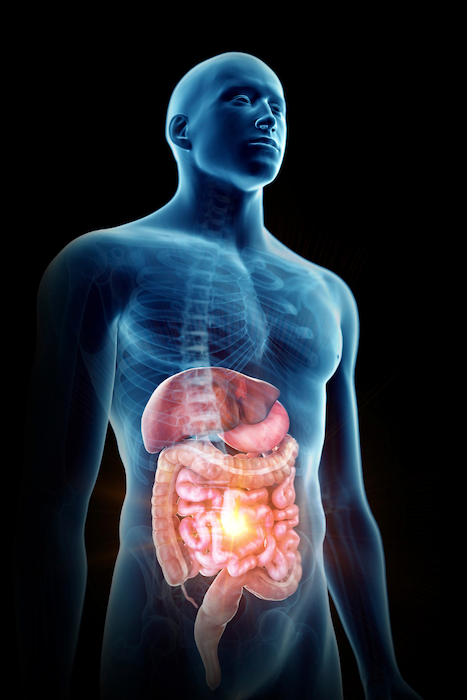
You have likely heard about at least one injectable weight loss drug currently on the market. Right now, they’re all the rage, making headlines all across the country. But how much do you really know about these drugs?
In this article, we want to help you learn more about these types of drugs. You’ll learn what they do in the body and why people are losing weight with them. But you’re also going to learn something you likely won’t hear anywhere else. It’s the reason we won’t even name this drug (it rhymes with Olympic). Dangerous side effects are coming out, and, as it turns out, it isn’t even a weight loss drug.
We’ll get more into that later, along with a natural, healthy, and effective plant compound that can do all of what the aforementioned drug can do and more.
But to understand how any of this works, you need to know about the metabolism, how these drugs interact with the metabolic system, and how the natural plant compound we want to tell you about balances and corrects the underlying problems within your metabolism instead of covering them up.
What is metabolic health?
Believe it or not, this seemingly simple question has experts a bit split. Before we get into the two schools of thought on this, let’s define metabolic syndrome.
Metabolic syndrome is a group of risk factors that increase the likelihood of developing heart disease, stroke, and type 2 diabetes. These factors include:
- Abdominal obesity
- High blood pressure
- High triglycerides
- Low HDL cholesterol
- High fasting blood sugar
In the United States, 1 out of every 3 adults have metabolic syndrome. Poor diet, a lack of exercise, and genetics can all cause metabolic syndrome.
Now that you know what metabolic syndrome is, let’s learn the two main ways experts define good metabolic health:
1️⃣ The absence of metabolic syndrome. [1]
2️⃣ Good overall health with a low risk of developing metabolic syndrome. [2]
But here’s the crux of it:
A healthy metabolism means that your body can digest and absorb nutrients from food without unhealthy spikes in blood sugar, blood fat, inflammation, and insulin.
These unhealthy spikes lead to all of the risk factors of metabolic syndrome listed above.

Am I metabolically unhealthy?
You may be asking yourself that now. And here’s the unfortunate answer: statistically, yes, you are metabolically unhealthy.
This is based on a research paper from the University of North Carolina that found that only 12.2% of adults in the United States are metabolically healthy. This means that most people have poor metabolic health. [3]
And if you think you’re safe because you have a healthier weight than most people, that might not even matter:
“Less than one-third of normal weight adults were metabolically healthy,” the researchers wrote in the paper. They added that 92% of people with overweight and 99.5% of people with obesity were metabolically unhealthy.
Signs that you have poor metabolic health include:
- You have a large waistline or are considered overweight.
- You have high blood sugar and often feel fatigued, have blurred vision, increased thirst, and increased urination.
- You sleep poorly.
- You have a poor memory.
- You struggle with mood.
- You have high blood pressure.
- You have high cholesterol.
Now, you may be starting to see how a poor metabolism can affect your health and your life. But now, let’s focus on how it impacts your weight. This includes weight gain and weight loss.
How does metabolism affect weight?
Since your metabolism is a system composed of chemical reactions that create and break down the energy required for life, sometimes a reaction within this change can go wrong. This may be genetic or the result of a lifestyle factor.
Your metabolism may become unbalanced in several different areas, causing weight gain (or even loss) and other side effects. Let’s take a look…
Ways your metabolism may go wrong include:
Not burning enough calories. Some bodies burn more calories than others due to genetics. But most of this comes down to calories in and calories out. If you take in more calories than you burn, your body will store these calories in the form of fat for later. But if more calories keep coming in, your body will never get around to using this stored energy, resulting in increased weight.
Insulin resistance. Insulin is a hormone that regulates blood sugar levels. When you eat, your blood sugar goes up, and insulin is released to manage this sugar. It sends it to the muscles and other places for a surge of energy. But when blood sugar levels are too high too often, your body may struggle to make insulin, or you may experience insulin resistance. This is when your cells no longer respond to insulin, and the insulin can’t remove the sugar from them, causing them to be stored as fat.
Thyroid dysfunction. The thyroid is a major regulator of metabolism. If the thyroid is underactive (hypothyroidism), it can cause metabolic slowdown, leading to weight gain, fatigue, and other symptoms. On the flip side, an overactive thyroid (hyperthyroidism) can cause rapid metabolism, resulting in unintentional weight loss, anxiety, and more.
Other hormonal imbalances. Hormones are messengers within your body. When levels are too high or low, it can cause complications within your body. Other hormones that can affect metabolism include:
- Cortisol: Chronic stress can lead to consistently high levels of cortisol, a stress hormone that can encourage fat storage, particularly around the abdomen. High cortisol levels can also make you more prone to hunger and cravings for high-calorie foods.
- Leptin resistance: Leptin is a hormone that signals to your brain when you’re full. If your body becomes resistant to leptin, you may not feel full even after eating, which can lead to overeating and weight gain.
- Ghrelin: This is the “hunger hormone.” High levels of ghrelin can lead to increased appetite and can be impacted by poor sleep, stress, or a high-sugar diet.

Mitochondrial dysfunction. Mitochondria are the “powerhouses” of cells, where energy (in the form of ATP) is produced. If mitochondria are not functioning properly, energy production can decrease, slowing down metabolism and contributing to fatigue, weight gain, and poor exercise performance. This can result from genetic factors, aging, or environmental toxins.
Chronic inflammation. Inflammation plays a role in insulin resistance and metabolic syndrome. Poor diet (especially a diet high in processed foods, sugars, and trans fats) can trigger systemic low-grade inflammation, which in turn can affect how your body processes glucose, fats, and proteins, leading to metabolic dysfunction and weight gain.
Gut microbiota imbalances. Emerging research suggests that the composition of gut bacteria can influence metabolism. An imbalance (dysbiosis) in the gut microbiota may impair digestion, nutrient absorption, and fat metabolism. Certain gut bacteria have been linked to increased fat storage and reduced calorie burning.
Deficient nutrient intake. Lack of essential nutrients – like vitamins, minerals, and amino acids – can impair metabolic processes. For example, a deficiency in magnesium or vitamin D can affect the body’s ability to regulate blood sugar, while insufficient protein intake can reduce muscle mass, which is a key driver of metabolism.
Sleep disturbances. Poor sleep or insufficient sleep can mess with metabolic hormones. For instance, lack of sleep can increase ghrelin (hunger hormone) and decrease leptin (satiety hormone), leading to increased appetite, particularly for high-calorie, high-carb foods. Chronic sleep deprivation is also linked to insulin resistance.

Genetics. Some people have genetic predispositions that affect metabolism. This could involve genes related to fat storage, appetite regulation, or how efficiently the body uses energy. For example, variants in the FTO gene are associated with an increased risk of obesity and might influence appetite control and fat storage.
Sedentary lifestyle. Lack of physical activity can slow metabolism. Regular physical activity, especially resistance training (which builds muscle), can help increase the resting metabolic rate (RMR). Inactivity can lead to muscle loss, which reduces the number of calories burned at rest.
Overtraining or calorie restriction. On the flip side, extreme calorie restriction (such as in crash dieting or eating disorders) or overtraining (without proper recovery) can cause the body to enter “starvation mode,” slowing the metabolism as a protective mechanism. This can lead to weight loss plateaus or even weight gain once normal eating is resumed.
Sex hormone imbalances (estrogen, testosterone). Both estrogen and testosterone play a role in how the body stores and burns fat. Low estrogen (e.g., during menopause) can lead to fat redistribution, particularly to the abdominal area. Low testosterone in men can result in muscle loss, which decreases resting metabolic rate.
Environmental toxins (endocrine disruptors). Exposure to certain chemicals (like BPA, phthalates, and pesticides) can interfere with hormone function and disrupt metabolic processes. These substances are known as endocrine disruptors and can alter how the body regulates metabolism, leading to weight gain, insulin resistance, and other issues.
Autonomic nervous system dysfunction. The autonomic nervous system (ANS) regulates involuntary functions like heart rate, digestion, and fat metabolism. Dysfunction in the ANS (due to stress, injury, or illness) can lead to metabolic issues like difficulty maintaining blood sugar levels or an impaired ability to burn fat efficiently.
Not enough water. Dehydration can impair metabolic functions, including the body’s ability to burn fat. Even mild dehydration can slow down the process of lipolysis (fat breakdown) and reduce exercise performance, which in turn affects overall calorie expenditure.
As you can see, there is a LOT influencing your metabolism, many of which directly affect your weight by changing how your body burns calories and/or stores fat.
It’s easy to see, then, that an imbalanced metabolism can cause weight gain or make it difficult to lose weight. Considering that research shows that most people have poor metabolic health, this could be the key to helping many people lose weight.
This is what those injectable “weight loss” drugs try to solve. But are they going about it the right way? Or just putting a band-aid over a larger underlying problem? Let’s find out…
How do these injectable “weight loss” drugs work?
Good question!
These are prescription drugs that are given to patients with type 2 diabetes to help manage blood sugar levels and lower certain risk factors in people with heart problems.
You may be thinking… what about weight loss? Isn’t that what it’s all about?
Yes and no. You hear about it everywhere for weight loss, but it’s not actually approved to do that. When someone tells you they’re taking this drug for weight loss, their doctor prescribed it “off-label,” meaning it’s not the actual intended use of the drug, but doctors may prescribe it for that purpose anyway.
This means this drug was never actually approved for weight loss. Despite this, an estimated 15 million Americans are taking these drugs.
Is this the reason for the unexpected side effects emerging as of late? Because people simply aren’t meant to be taking this pharmaceutical as a weight loss trend? We’ll discuss that more below. But first… how do these drugs actually work?
Remembering everything we learned about metabolism above, these drugs try to trick that system. They involve a naturally produced hormone called glucagon-like peptide-1 (GLP-1). These drugs mimic GLP-1 in the body.
By mimicking GLP-1, these drugs:
- Activate GLP-1 receptors in the brain to stimulate the pancreas to produce and release insulin.
- Slow the movement of food through the stomach, causing you to feel full for longer, prevent blood sugar level increases, and reduce food cravings.
- Increase the amount of insulin in your body to better manage blood sugar spikes.
Taken together, the three above changes can prevent excess sugar from being stored as fat while cutting cravings and reducing calories.
In short, these injectable “weight loss” drugs are prescribed off-label to help people lose weight. They work by mimicking a hormone in the body that triggers better blood sugar regulation. It’s changing one part of an unhealthy metabolism so it can function a bit more like a healthy metabolism. But is that really going to fix the underlying problem?
Well, these drugs have worked for many people. But at what cost? Because others have had less luck. This includes mild to severe side effects, the stigma attached to taking a weight loss drug like this, and an increased risk of cancer.
Let’s now get into the side effects of injectable “weight loss” drugs.
Side effects of Ozinjectable “weight loss” drugs

The full effects of these drugs aren’t actually known. In fact, they weren’t even tested for effects in those looking to lose weight. Weight loss was simply a “side-effect” that was noticed and capitalized on. But here’s what we do know about these drugs and their side effects.
❌ Boxed warning side effect:
A boxed warning side effect is the most serious type of warning from the Food and Drug Administration (FDA). These drugs have a notice on them informing users that these drugs have been shown to cause thyroid tumors and thyroid cancer in animals.
Human trials need to be done to determine whether this is a risk in humans as well and to what degree.
If you still think you may be interested in taking these drugs even after that, let’s look at some other side effects.
❌ Mild side effects include:
- Constipation
- Diarrhea
- Abdominal pain
- Vomiting
- Nausea
- Burping and gas
- Fatigue
- Increased heart rate
- A change in how food tastes
- Indigestion or acid reflux
- Injection site reactions
- Dizziness
- Headache
❌ Serious side effects include:
- Diabetic retinopathy (damage to the eyes associated with diabetes)
- Hypoglycemia (low blood sugar)
- Gallbladder disease (including gallstones and gallbladder inflammation)
- Pancreatitis
- Kidney problems
- Thyroid cancer

❌ Emerging mental health concerns:
One of the other types of injectable “weight loss” drugs (not the one you always hear about) has been directly associated with depression. This specific drug is very similar to the more popular one, so it’s no surprise that those on the popular one are also experiencing negative mental health effects.
Health agencies, including the European Medicines Agency and the FDA, are looking into a rise of reports of people who are taking these drugs experiencing mental health side effects such as:
- Depression
- Anxiety
- Suicidal thoughts
❌ Stigma and long-term uncertainty:
Finally, many people feel like there’s a stigma around taking a pharmaceutical aimed at weight loss. There’s a fear that people may perceive them as taking the easy way out, not actually being healthy, and being dependent on a drug.
While we don’t agree with this perception, it is understandable to worry about feeling reliant on the medication. When should you ween off of it? Will the weight come back? Was the metabolism issue actually fixed? And if you stay on them, will the side effects be more damaging than being overweight ever would have been?
These are questions that swim around in many people’s minds when they’re taking these types of drugs.
We want to offer a more natural way. If your metabolism is struggling, you should fix it. Thankfully, there’s a plant that can help you do just that without the worry.

Hemp and “diet CBD”
Did you know that within your body there is a system meant to interact with cannabinoids, the compounds found within hemp? If you don’t know what hemp is, it’s to weed (or marijuana) what non-alcoholic beer is to beer. It’s marijuana that contains essentially none of the psychoactive cannabinoid THC (which is the cannabinoid that gets you high).
But hemp contains all the other cannabinoids that are beneficial to your health and, you guessed it, your metabolism.
Your body is literally designed to interact with cannabinoids. It uses them to balance systems within the body, like your metabolism. This is a far more natural and holistic approach to weight loss.
So, how do these other cannabinoids help? Well, unlike THC, which makes you hungry and gives you the “munchies,” “diet cannabinoids” like THCV actually suppress your hunger, limit your cravings, and boost your metabolism so that your food gets processed faster and less of the calories you take in gets stored as fat.
If you’ve heard talk of a “diet weed,” that’s THCV. But it doesn’t cause any psychoactive effects. This is why we prefer to say “diet CBD” because, like CBD, THCV offers many health benefits without getting you “high.”
If you’re looking for a natural way to lose weight, be healthier, and balance your body’s natural systems WITHOUT any scary side effects, this is for you.
But how does your body actually interact with these cannabinoids? Well, your body actually makes its own cannabinoids! And they work within a system called the ECS.
The endocannabinoid system (ECS)
Within your body, you have what’s called the endocannabinoid system, or ECS. It’s an active and complex cell signaling network comprised of endocannabinoids, enzymes, and cannabinoid receptors that help regulate several functions throughout the body.
The word “endo” refers to “within,” which is why your body’s natural cannabinoids are called endocannabinoids. We’ll get into these specific types of cannabinoids in a moment.
Research shows that the ECS regulates several bodily functions, including: [4]
✅ Energy ✅ Blood pressure ✅ Sleep ✅ Gut health ✅ Appetite ✅ Pain ✅ Memory and learning ✅ Immunity
It may also be beneficial in treating or reducing the risk of certain pathological conditions, such as: [4]
✅ Parkinson’s disease ✅ Huntington’s disease ✅ Alzheimer’s disease ✅ Multiple sclerosis
What are endocannabinoids?
Short for endogenous cannabinoids, endocannabinoids are naturally occurring lipid-based neurotransmitters within the body. Neurotransmitters are chemical messengers that send signals between nerve cells.
If these neurotransmitters aren’t present, signals can’t be sent, and important functions are left undone or poorly managed. As mentioned above, these endocannabinoids manage a lot of functions, and without them, your health can suffer.
There are two main endocannabinoids in your body.

1️⃣ Anandamide (AEA): Named after the Sanskrit word ananda, meaning bliss, this messenger molecule regulates pain, anxiety, hunger, and digestion. It gets its blissful name because it also helps us feel relaxed and happy.
2️⃣ 2-archidonoyl glycerol (2-AG): This important endocannabinoid is involved in a wide range of physiological functions, including emotion, cognition, energy balance, pain sensation, and neuroinflammation.
While these two endocannabinoids bind to a range of receptors within your body, 2-AG selectively binds to two cannabinoid receptors that are front and center in the ECS, as well as other receptors within the body. They appear to be major regulators, not only binding to receptors themselves but managing the release of other key neurotransmitters.
But here’s the problem with endocannabinoids…
Remember, all of this stuff about the ECS is brand new in terms of scientific research and discovery. Being only found in 1988, mixed with how difficult it was up until 2018 to study cannabinoids at all due to their legality, research into the ECS, endocannabinoids, and how cannabinoids interact with your body are state-of-the-art.
And one thing that has been getting more and more notice lately is the very likely possibility of an endocannabinoid deficiency that many people may be living with. [5]
This is when your body struggles to make enough endocannabinoids – namely the two mentioned above – and, as a result, critical messages aren’t sent, and essential functions throughout the body are improperly managed or fail altogether.
This is what’s known as an imbalanced ECS. There aren’t enough cannabinoids to interact with the receptors, which causes the body to struggle. This can lead to conditions including:
| ❌ Chronic pain | ❌ Anxiety or depression |
| ❌ Weight gain | ❌ Poor metabolism |
| ❌ Trouble sleeping | ❌ Weakened immunity |
| ❌ Increased inflammation | ❌ Skin issues |
If you experience any of the above, you may have an imbalanced ECS due to an endocannabinoid deficiency.
So, what can you do?
Well, send in more cannabinoids like diet CBD…

Diet CBD is backed by research
Unlike the potentially harmful pharmaceuticals making the rounds, diet CBD has been studied specifically for weight loss, and we understand how it works.
Right now, in your body, your ECS may be unbalanced, causing your metabolism to run poorly. But by sending in cannabinoids to boost the ECS and bring balance back to your body, you can see real positive change WITHOUT and side effects to worry about.
SomaLeaf now offers a potent formula of the most well-researched cannabinoids, especially when it comes to fixing metabolism.
In fact, this very formula was studied for weight loss and metabolism.
Those taking SomaLeaf’s Metabolic Pearls for 90 days saw:
✅ Up to 22 pounds lost.
✅ An up to 8-point BMI point reduction.
✅ As high as 6 inches lost in the waistline.
✅ A 99% reduction in unhealthy food cravings.
✅ Better bloodwork scores.
✅ Improved sleep in both depth and duration.
✅ Higher calories burnt passively while asleep.
✅ Reduced stress and anxiety.
✅ And lower pain.
You can experience all of the above and more just by helping raise levels of something your body is already trying to make.
If you’re ready to lose weight naturally, all you need to do is go here.
We offer a 180-day return policy in which we allow you to return your order (even if it’s been opened and used) for ANY reason.
If you want to learn more about these cannabinoids, more studies, and specific benefits, then keep reading!
Cannabinoids benefits
Our Metabolic Pearls are a concentration of the most studied cannabinoids, especially when it comes to weight management. Below are there benefits, backed by science.

THCV (Tetrahydrocannabivarin)
✅ Controls food cravings – THCV has been dubbed “diet weed” for a reason – it helps you control your food cravings. By interacting with CB1 receptors in the brain, THCV regulates the part of the brain associated with food reward and hunger. This will lower your appetite and your desire to snack constantly, being an enormous help for those who are looking to cut calories and lose weight. [6]
✅ Boosts metabolism – THCV also increases satiety and boosts metabolism, allowing you to feel full and satisfied faster and having your body process your food faster, resulting in increased calorie burning and less fat storage. [7]
✅ Manages blood sugar levels – Blood sugar that’s too high can mean your body is having trouble breaking down sugars, putting you at risk of diseases like type 2 diabetes. According to research, taking THCV can help. A study published in 2020 showed that THCV influenced sugar metabolism and led to a higher performance of glycemic control in subjects with type 2 diabetes. But even if you don’t have diabetes, you could be prediabetic and not know it like millions of other Americans, meaning your body is still storing too much sugar as fat, resulting in weight gain. [8, 9]
✅ Lowers inflammation – Chronic inflammation is not just the precursor to most diseases, it is directly linked to being overweight. Recent research in mice found that THCV reduced the number of inflammatory cells in the body and the amount of nitrite, a carcinogenic molecule produced by inflammatory cells. [10] [11]
✅ And so much more – Additional benefits of THCV that have been found through scientific research include increasing focus, protecting the brain, treating psychosis, and clearing up acne. [12, 13, 14]
CBDV (cannabidivarin)
✅ Supports weight loss through the ECS – One study found that 100% of those taking a cannabinoid mixture that included CBDV saw a reduction in their weight over a three-month period, with one person losing as much as 22 lbs and everyone at least 5 lbs. [15]
✅ Reduces anxiety – One study showed that CBDV could reduce anxiety in participants with autism spectrum disorder (ASD) by increasing GABA levels in the brain and stimulating certain neurotransmitters. [16]
✅ Eases nausea – A large contributor to weight management is digestive health. Thankfully, CBDV can help alleviate a common symptom of poor digestion: nausea. One study tried to see if CBDV might make someone nauseous, but the study revealed that the compound, in fact, does the opposite! [17]
✅ Improves muscle health – A 2019 study looked at how CBDV affected Duchenne muscular dystrophy (DMD), a condition characterized by chronic inflammation and skeletal muscle damage and degeneration. The results showed that CBDV may improve movement, reduce inflammation, and restore and enhance muscle function. [18]

CBD (cannabidiol)
✅ Boosts metabolism – CBD studies have shown that CBD can work to boost metabolism and reduce food intake by interacting with two of the main receptors within the ECS – CB1 and CB2. Both of these receptors play a role in metabolism. [19]
✅ Increases energy – Your endocannabinoid system (ECS) plays a major role in your energy levels, but it can often fall out of balance. CBD not only mimics the natural cannabinoids that your body produces, but it’s extremely versatile and can even increase the effectiveness and longevity of your naturally-made cannabinoids. This allows your ECS to function optimally while restoring energy balance. When you have more energy, you can be more active and outgoing and feel like your best self! [20, 21]
✅ Reduces anxiety – Stress and anxiety can really get in the way of your weight loss goals, especially if you cope by eating. Thankfully, CBD can manage stress, relax you, and regulate your mood. This can allow you to get into a calm, focused flow. [22, 23]
✅ Turns “bad” fat into “good” fat – CBD helps your body turn white fat – AKA “bad” fat – into brown fat – AKA “good” fat – which is actually a type of fat that helps the body burn calories! Studies also show that not only does CBD convert your white fat into brown fat, but it also helps the body break down fat more efficiently. [24]
✅ Promotes wakefulness – CBD studies have found that the compound increases alertness and helps users feel awake by increasing brain activity. Researchers believe this is due to CBD regulating the sleep-wake cycle, allowing you to be energized in the morning and throughout the day. [25]
✅ And so much more – While CBD will help you meet your weight loss goals, it offers many more health benefits. These include reducing pain, treating anxiety disorders, lowering blood pressure, protecting the brain, and managing inflammation throughout the body. [26, 27, 28, 29, 30, 31, 32]
CBG (cannabigerol)
✅ Provides energy and focus – CBG has been recently popularized due to the energy and focus it provides to its users, and early research is revealing why. For example, in one study, CBG was found to improve task performance in rats. [33]
✅ Increases feelings of happiness – Through supporting the ECS, CBG interacts with key receptors and increases important endocannabinoids like anandamide, a brain chemical responsible for mood stability and feelings of happiness. [34, 35]
✅ Regulates mood – CBG has been shown to positively impact neurodegenerative diseases and mood disorders, including depression. [36]
✅ Boosts cognitive function – Research into CBG has shown that it can help neurons reach farther and communicate faster, and it may also contribute to neuro regeneration – the creation of new brain cells. [37, 38]
The entourage effect
The question then becomes which cannabinoid should you take. Well, the answer is the more the merrier. It’s called “the entourage effect.” Research has shown that when you take cannabinoids TOGETHER, they boost the benefits of each other. [39]
1 + 1 = 3 in the cannabinoid world.
This is because of a synergistic effect of the compounds within the cannabis plant.
Upon discovering the ECS, researchers started investigating how different cannabinoids impacted this carefully balanced system within the body. Through this research, they realized something incredible…
The more cannabinoids present, the greater the therapeutic benefit to the body.
While most of this research has been focused on combining THC and CBD, showing that these two have a synergistic effect, there has also now been research into how other cannabinoids react together.
For example, one study showed that, while both CBD and cannabinol (CBN) reduced pain, the pain reduction was greatest when both CBD and CBN were taken together. [40]
And it’s not just cannabinoids within the cannabis plant. There are also plenty of terpenes present. These are compounds that give plants their scent, and they often have incredible health benefits. This is especially true when it comes to the cannabis plant. But research shows that when these terpenes are taken with cannabinoids, they make the benefits of the cannabinoids even stronger.
A 2011 review of studies found that taking cannabinoids and terpenes together increases their benefits for: [41]
- Pain
- Inflammation
- Anxiety
- Epilepsy
- Cancer
- Fungal infection
Surrounding a promising cannabinoid like THCV with other powerful cannabinoids will only improve its effects.
If you want the benefits of “diet weed” or “diet CBD,” then you want to be taking a FULL SPECTRUM THCV and CBDV supplement that contains a range of proven cannabinoids (along with the natural plant terpenes) for optimal effects.
This is why we here at SomaLeaf created our Metabolic Pearl Soft Gels.
Studied and shown to have metabolic-improving effects that result in REAL benefits like less cravings and lower weight, these soft gels are super easy to take. Just one soft gel per day is all it takes to get a full dose of THCV, CBDV, plus other beneficial cannabinoids like CBD and CBG that have been shown to have a synergistic effect on boosting metabolism, reducing appetite, and increasing weight loss.
We hope that through this article you learned that there are healthier ways to lose weight. No side effects, risk of cancer, or mental health effects. Only added benefits.
We give you 6 months to see a difference or your money back. Click the link above for more details.





